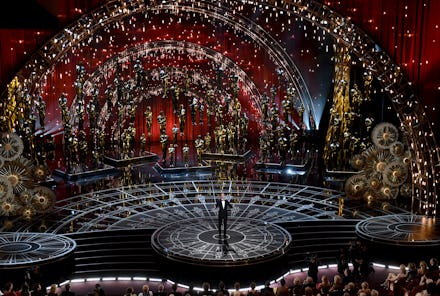4 Harsh Truths About the Oscars Reveal There's So Much Work to Be Done

Although plenty of films released over the past year featured groundbreaking portrayals of women and people of color, you'd hardly know it from the 2015 Oscar nominees. And though the awards ceremony Sunday night had some seriously inspiring progressive moments, there's a lot of work still to be done.
As we discuss this year's winners and losers, let's celebrate the progress we've made — without forgetting how far we still have to go.
1. Oscar voters are still mostly old white guys.
Despite being helmed by president Cheryl Boone Isaacs, a woman of color, the majority of the Academy of Motion Picture Arts and Sciences voters look pretty much the same. According to BuzzFeed, Oscar voters are 93% white, 76% male and, on average, 63 years old. That's not exactly a model of diversity.
2. Oscar nominees are still mostly white guys, too.
This year, there were seven Oscar categories in which every single nominee was male, according to the Women's Media Center, and no black actors, screenwriters, directors or cinematographers were nominated at all. In fact, this year marked the first time since 1998 that all acting nominees were white, as Salon reported. Fewer than 20% of nominees for non-acting (and, therefore, non-gender specific) categories were women, the New York Times noted.
3. Women have been excluded for as long as the Oscars have existed.
Since the awards ceremony in 1929, just 16% of all nominees have been women, according to the Oscar Database. The highest percentage of female nominees during a ceremony occurred in 1994, and was a measly 26%.
Things have not improved in the intervening years: The Women's Media Center reports that only 19% of all Oscar nominations since 2012 have gone to women, and women have only won for directing and writing once in the past 10 years.
4. Women of color have fared even worse.
In the 87-year history of the Oscars, only seven black women have ever won awards for best actress or best supporting actress, according to Truth in Reality. The organization further notes that each of these winning roles arguably perpetuated racial stereotypes — from the "mammy" figure (Octavia Spencer in The Help) to the "welfare queen" (Mo'Nique in Precious) and beyond.
If we take anything away from the 2015 Oscars, it's that there's a lot more work to be done.